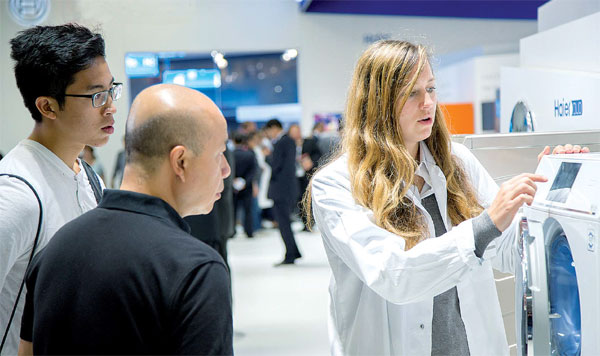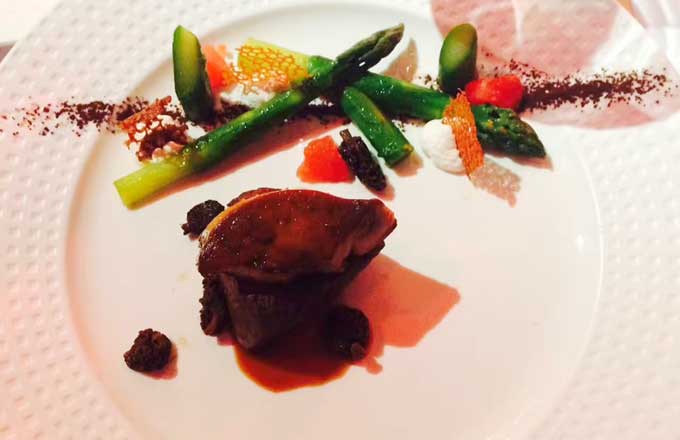Haier targets UK taste for luxury
|
Visitors at Haier's stand at IFA 2016, one of the world's biggest trade shows for consumer electronics, in Berlin. Provided to China Daily |
Manufacturer of major household appliances aims for the top in British sales strategy
Haier, the world's biggest manufacturer of white goods, or major household appliances, is strategically expanding into the UK's luxury appliance market, using experience accumulated through its decadelong trial-and-error history in Britain.
"Our definition of premium is good function, luxury finish and designs close to the customers' needs. We want to design products that satisfy customers' lifestyles," says Haier UK Market Director Dave Yearsley.
The Qingdao-based company is one that reflects China's economic growth. Founded in 1984, a few years after China's reform and opening-up, the company quickly grew by leveraging the country's cost-effective manufacturing sector.
The manufacturing competitiveness of China allowed Haier to become the original equipment supplier for many Western brands. In fact, when Haier first established a base in the United Kingdom in 2007, its primary goal was to support partners that resold its products.
In 2012, Haier decided that volume and revenue were not enough, and that brand value creates significant profits. That was when the company started to sell its own branded products in the UK's retail market, through chains including Dixons and Argos, and via independent retailers, such as Euronics.
"These platforms were happy to accept our products because they knew us already as an OEM (original equipment manufacturer) supplier, and they could be assured of our quality," Yearsley says.
Refrigerators, freezers and washing machines dominate Haier's product offerings so far. They are products that have unique selling points, such as the multi-door feature on refrigerators that allows consumers to separate food in a more organized way. Another feature is the lower-than-average noise level of Haier washing machines.
Haier realized that it needed to go one step further than simply supplying functioning products.
"In the past, we have not had the infrastructure to support our sales," Yearsley says. "We thought that we could just have good products and rely on one-off promotion deals, but that did not work.
"The UK market is highly competitive in the white goods sector, so having the right infrastructure to support our sales is very important. And infrastructure means having the right human resources, organizational structure and the vision of where we want the brand to deliver in the next five years."
Meanwhile, Haier also moved into many other global markets. Its international expansion started in emerging economies, including Indonesia, Malaysia and the Philippines. By the turn of the century it had expanded into markets such as the United States.
In the US, Haier entered the market by selling compact refrigerators to college students, which filled a gap in what was available. In Europe, the company established a regional headquarters in France, which oversees subsidiaries in Belgium, Britain, Germany, Italy, Poland, Russia and Spain.
A more-than 1,000-square-meter research and development center opened in Nuremberg in 2011, where designs are refined for dishwashers, refrigerators and freezers. Meanwhile, Haier's sales grew rapidly in China and internationally.
According to the latest data from Euromonitor International, the company's retail volume topped the white goods market for the seventh consecutive year in 2015, with 9.8 percent of global retail volume.
Yearsley says Haier's products are the reason for its competitiveness, and the fact that they are created through Haier's research and development section is important. Its R&D capability was strengthened when it acquired the New Zealand appliance brand Fisher & Paykel and the appliance unit of US-based General Electric.
"We feel we are very much a key part of our headquarters' research and development process, because we participate in the long-term projection process, contributing our thoughts on products that would be useful for the next two to three years," he says. "At the same time, we also have a six-month rolling calendar for forecasts, to set a clear operation process of what is needed to support our customers."
Along with the mission of building the Haier brand in the UK, Haier has continued to supply other brands, although the exact arrangements are confidential.
Yearsley says Haier's strategy of managing both the supply of manufactured products to other companies and the selling of its own branded products, without creating competition between the two, is done by ensuring its products that are branded for other companies are aimed at the mass market, while Haier's own branded products are directed at the middle and premium sectors.
If retail price is an indication of Haier's market positioning, it has certainly succeeded in creating a luxury image. Items sold through Argos, for example, include a top-of-the-line fridge-freezer that retails for 1,899.99 ($2,336; 2,205 euros), which is second only to Samsung's fridge-freezer, which sells for 2,199.99.
By comparison, the most expensive fridge-freezer sold by Chinese white goods manufacturer Hisense through Argos retails for only 799.99.
Haier products have received favorable industry reviews. In 2015, one Haier fridge-freezer was described by UK product review website, Trusted Reviews, as "an outstandingly practical and stylish fridge-freezer" and awarded a score of 9/10. Reviewer Richard Stevenson wrote that he was particularly impressed by the product's design, its flexible compartments, full-size freezer drawers and consistent cooling throughout the refrigerator.
However, having great products alone may not be enough in a mature white goods market, such as the one in the UK, says Doreen Wang, global head of brands at Kantar Millward Brown, a British multinational market research firm.
"Building a strong brand in the white goods market is important, and Haier's overseas investment on brand-building is limited, compared with other Chinese companies in the consumer electronics and white goods market, such as Huawei. Haier would benefit from spending more on promoting its brand story," Wang says.
"Haier also needs to support its ambition to build the premium brand with a strong brand story. Having products with cutting-edge functions is not enough to establish a premium brand. Luxury brands are not about functions; they are about brand story, brand heritage, brand DNA. So brands need to create an emotional attachment with their consumers."
Comparing Haier's expansion paths in the UK and the US, Wang says one key difference has been timing: Haier started in the US early, about 15-20 years ago. Back then, the company understood that, as a newcomer, it needed to find a niche sector to start with, so it found the student market and was successful there.
By comparison, Haier expanded into European markets during the past decade. "By then, more and more Chinese firms had expanded into Europe and, consequently, they were becoming more confident, and this confidence may have led Haier into hoping to position themselves as a premium brand, which is ambitious but may not necessarily work," Wang says.
Looking into the future, Yearsley says one strategic focus his team is looking to implement is increased market penetration within the laundry category.
"At the moment, we have about 75 percent of revenue generated from our refrigeration category, but in the future our objective is to generate an equal share of revenue between refrigeration and laundry, to support building the Haier brand strength in the overall market."
Haier is also in the process of launching air conditioning products for the business sector in the UK.
"Haier is a major player in this category across the world, and this provides us with a totally new route into the UK market to support building our future growth success."
Before joining Haier, Yearsley worked for the German company Brita Water Filter Systems as sales director for the consumer division. He decided to join Haier because he was looking for a new challenge.
"Working for the world's largest white goods manufacturer that is currently not known in the UK provides a huge opportunity," he says.
cecily.liu@mail.chinadailyuk.com























